- Global Komaba
- English
- Outbound from Komaba
- Study Abroad Programs
- Global Praxis | Short-term
- Reports
- Course participant reports 2015
Course participant reports 2015
A Semester
Italy
- Agriculture and Community
-
Haruka Ishi(LI)
I don’t hate eating. If anything, I would say that I like it. But I really hate eating things that don’t taste good, and if that is the only thing available, I would rather not eat at all. I was raised in an environment where being able to eat good food was taken for granted, because I was born in modern-day Japan where food is abundant, and have never had to experience going hungry. However, what does good food really mean? Humans have to eat to survive, so shouldn’t any food be considered good food? But no, taste is subjective and each person’s taste buds react differently, identifying different tastes as “good.” My tongue is ridiculously picky, much pickier than most people, and if something isn’t really delicious then I refuse to eat it. Human beings’ sense of taste is a mystery. I find that I have tired of my own intense fussiness.
Fortunately, I like Italian food, even with my picky tongue. I love good food almost too much, and I am more interested in food than the average person. I often wonder what other people from other cultures are eating, how they produce that food and how they live. How is what they eat different from the food that I know, and then again how is it similar? I wanted to visit a foreign country and use my own five senses to really experience that culture’s food, from production to the dinner table. I departed for Italy to satiate my hunger, expecting the new discoveries and fresh surprises that come from visiting a foreign country.
First off I should mention that not all the Italian food we ate suited my palate, and to be completely honest, even compared with Italian food in Japan, most of the food we ate seemed…average. Although when I consider my normal picky eating habits I realize that I should have expected this. However, I was able to experience something greater than simply tasting different foods. With everything that I ate, I felt Italian peoples’ love for their home and their high standards for local foods.
I learned more on this trip than I can fit on this page, but for now I will focus on three main aspects of the trip. The first is food production, the second is those who provide food and cuisine to others and the third is those who enjoy that food or cuisine.
First off, the experience of actually visiting sites of food production was a valuable one which I could not have experienced had I not gone on this trip with the university. In Parma, we visited a Parmigiano-Reggiano factory and a prosciutto factory. Parmigiano-Reggiano cheese and prosciutto are both produced in only a few select factories that still use traditional production methods which make use of Parma’s natural climate. The craftsmanship that goes into production is important, and it takes more than 30 years of training before a craftsman can start his own business. Also, by staying at an agricultural tourism lodge which raised cattle I was able to experience living on a farm that produced the milk used in cheese production. On top of that, we visited an agricultural tourism center which oversaw agricultural land close to the city and other social agricultural sites and there were able to see of various aspects of Italian agriculture.
Secondly, we visited places where Italian people actually go, rather than just going to tourist spots, and I found this experience very interesting. We saw markets in Torino and Bologna. These markets were the kitchens of Italy, overflowing with the energy of those actually living there. We also stayed in five different areas in northern Italy and enjoyed lunch and dinner at local restaurants. Wherever we ate, I could feel the warmth and comfort of food made in traditional methods, using the local foods of that regions. From this experience we were able to feel the regional flavors of Italian cuisine.
Finally, we learned two new things about those who consume and enjoy Italian food. First, we learned about a way of thinking which associates a sort of spirituality with slow food. We visited The University of Gastronomic Sciences, which was founded by Slow Food International, an organization which promotes positive attitudes about food around the world. There we participated in a Piedmont cuisine cooking class and a taste experiment, and listened to a lecture on the principles of and education provided at The University of Gastronomic Sciences. I admired the enthusiasm and meticulousness with which people regarded food. The perception of and ideology associated with food which we learned about at the University of Gastronomic Sciences is only one aspect of a bigger picture. However, it is a seed that may lead to us dealing with food in a more positive, proactive way. We gained another piece of valuable information while eating at local restaurants. We noticed how people were enjoying food by taking time to share meals with close friends and family over good conversation, which emphasized the importance of food in the everyday lives of Italian people. From this I learned not getting caught up in our busy lives and taking time to really enjoy food while we eat it, which is something that we have to do every day, can sometimes give us a sense of peace.
I didn’t just learn about food on this trip. While I watched people of different races, who speak in a language different from mine while bustling about in their daily lives, I was able to successfully appreciate the “life” and “culture” of a different place. Also, I met various people and was able to speak with them. My dealings with these people helped give even greater depth to what I learned in Italy. For example, through exchanges with the students at Milano University, I learned about the differences between our two cultures and had a chance to rethink my views about my own country of Japan. Also, I learned new things about Italy from Mr. Tominaga’ talk at the Milano Japanese Consulate. On top of that, the experience of discussing and sharing opinions with Professor Osawa and the other members of our group was stimulating because I was able to view my own thoughts and opinions in a new light. I would like to thank Professor Osawa and the other members of our group. After 11 days together, visiting tourist spots and sharing meals together, I regretted that we had to part.
Being in Italy, seeing a different gastronomic culture, using my own five senses to learn and sense cultural differences, as well as glimpsing the lives of various peoples in a new environment invoked in me a new academic interest. Even more than that, I was able to rethink what it means to “eat,” or in other words, what it means “to live.” I will use this experience to become a more global person, who uses their global perspective to interact with a wide range of other cultures and foods in a proactive way.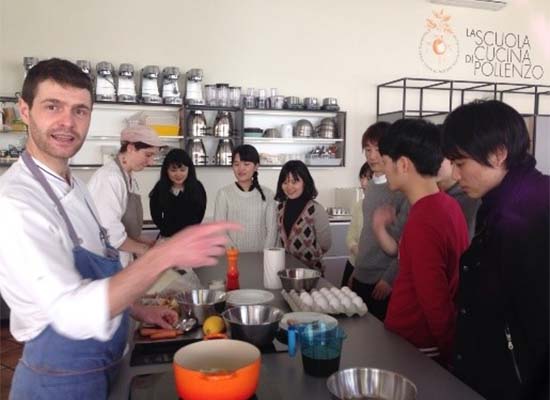
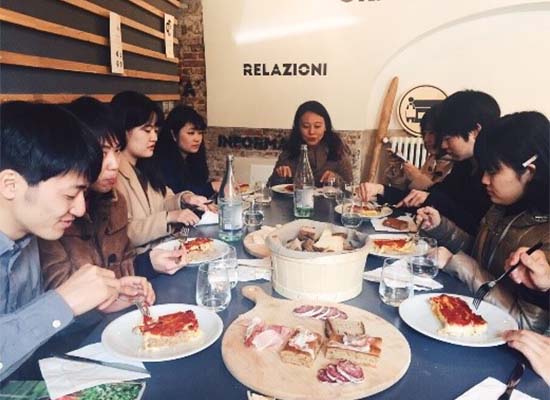
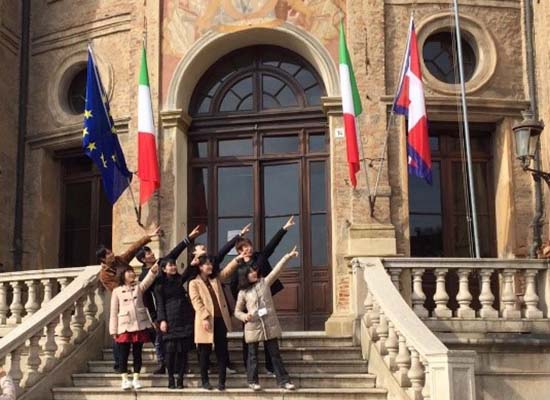
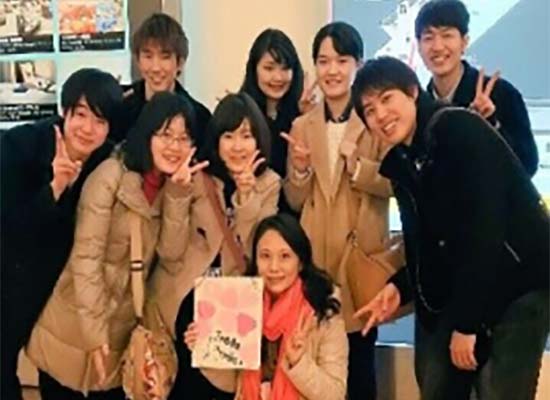
Malaysia
- Multiethnic and Multicultural Society
-
Kosuke Hasegawa (LIII)
The course “Malaysia: Multiethnic and Multicultural Society” was aimed to deepen our understanding of the variety of religion, race and culture in Malaysia and especially the industries related to Islam through a pre-studying program at Komaba campus and a study-trip to Malaysia. Unfortunately, the tour which was planned for March 6th to 13th was cancelled, because of the increased danger of terrorism. It was an fascinating and elaborate study-program made in cooperation with the authority in Malaysia (included visiting local universities and even a session with Dr. Mahathir Mohamad, the former prime minister of Malaysia), so the cancellation was very disappointing. However, many people from Professor Nanako Sawayanagi down made the pre-studying program and the substitute classes enjoyable and intensive, so we had a very good time.
We learned three things through this program. First, we learned a lot about Islam. Through careful consideration of its roots and present situations, we learned that Islam, which is sometimes regarded as problematic, consist of humane and logical ideas. For example, Muslims go on a fast once a year in the Ramadan month in order to understand the feelings of the poor. After sunset, dinner which is paid by Zakat, donations from the rich, is treated to the poor. Moreover, we went to see Tokyo Camii, a mosque near Yoyogiuehara-Station. We saw the solemn interior, and we felt refreshed. On the other hand, Professor Tetsuya Sahara at Meiji University talked to us about the threat of terrorism which is spread globally by the Islamic-State (IS) and has now become an everyday event.
Next, we learned about the variety of race and culture, by studying the case of Malaysia, which has many racial groups. In Malaysia, with 60% Malaysian, 30% Chinese, 10% Indian and other minorities, there are many situations caused by the variety of race and culture. It’s not only about culture, but also about political and economic matters, which might at first seem unrelated to the racial variety. Mr. Kawabata Takashi, who works at NewsPicks, talked about the political situation in Malaysia. He said that there are many racial parties in Malaysia, and races may become harmonious. In Japan we don’t think about the variety of race, so the topic was new and surprising.
Lastly, we studied deeply about the Halal Industry and Islamic finance, which are developing in Malaysia. Islam has some precepts about food, like Muslims can’t eat pork, so certificating foods which are suitable for the precepts (called Halal) is a big business, and Malaysia is a hub of the industry. Mr. Akmal Abu Hassan, the CEO of the Malaysia Halal Corporation (MHC) said that Japan should promote this business in order to accommodate Muslim visitors. It is so to speak Omotenashi (treatment) in Japanese. We felt that to start with Japan should get ready to take in foreigners like Muslims for the Tokyo Olympic Game in 2020.
Even though we couldn’t study in Malaysia, we could learn a lot of things thanks to Professor Sawayanagi and many others' cooperation, and we all greatly appreciate their help.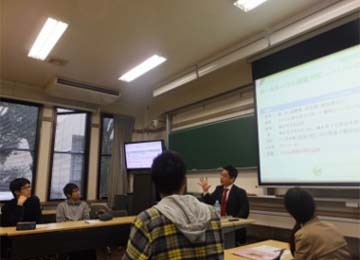 Mr. Akmal talks about Halal and Japanese Society.
Mr. Akmal talks about Halal and Japanese Society.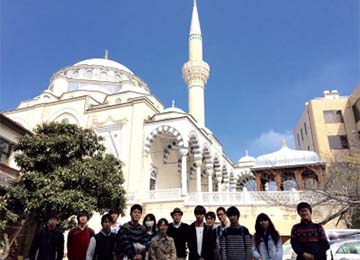 Visit to Tokyo Cami at Yoyogi Uehara
Visit to Tokyo Cami at Yoyogi Uehara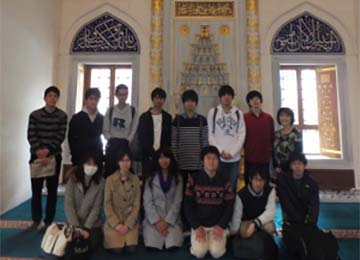 Visit to Tokyo Cami at Yoyogi Uehara
Visit to Tokyo Cami at Yoyogi Uehara
Australia
全て開く
- Advanced English at Sydney University
-
A.S.(SIII)
39 students participated in this program with Professor Sawayanagi and Mr. Sato as our guides. Our main purpose was to participate in programs at CET (Centre for English Teaching) for two weeks from January 11th to 22nd.
We were divided into two courses, General English and Graduate Academic Skills (GAS), based on an exam conducted at Komaba beforehand. There was 1 GE class and 5 GAS classes. The number of the students from the University of Tokyo was limited to 7. I participated in the GAS course.
GAS is a program held for five weeks during summer break for students who will enter a master course at the University of Sydney the following semester. We were allowed to join the second and the third weeks of the course.
The aims of the lectures were to judge the credibility of the papers we read, to brainstorm, to write literature review, to give a presentation, and to write an essay on what we had thought about deeply using information from sources we gathered. Discussing research and study methods in class was really new to me, and I was a little surprised. There were many students from Asia whose native language was not English. They stimulated us a lot, and I especially was amazed at their presentation skills. I think it was good to get to know students from other countries and make friends with them.
The GE and GAS lectures finished at noon and we took part in various programs prepared for us by CET prepared in the afternoon. Specifically, a tour around the campus of the University of Sydney, two workshops to improve our international communication skills and the ability to solve problems, doing homework with support of the students of the University of Sydney, two lectures from two professors of the University of Sydney about the history of Australia and Australian indigenous people, and a visit to National Museum of Australia.
We did not have lectures or specific programs on the weekend and in the evening on weekdays, so we were free to enjoy sightseeing in Sydney. For example, Taronga Zoo, Bondai Beach, Manly Beach and Blue Mountains were popular places to visit.
There were also two events Professor Sawayanagi and Mr. Sato planned. We saw “La Bohème” at the Sydney Opera House on January 13th. Also, we had the opportunity to talk with alumni of the University of Tokyo living in Sydney. These two events were truly unique opportunities.
We learned many things from these special experiences. Finally, I would like to say thank you to everyone who supported us during this course, especially to Professor Sawayanagi and Mr. Sato. Thank you very much.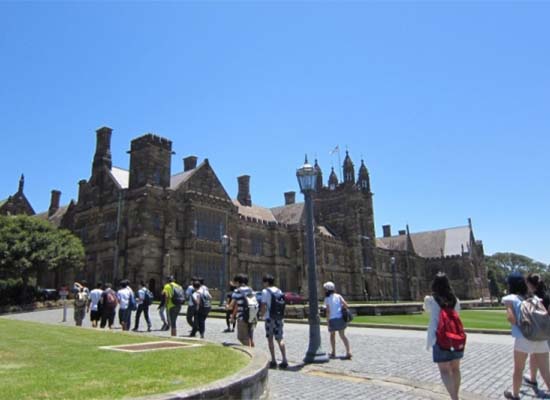 The Campus of Sydney University
The Campus of Sydney University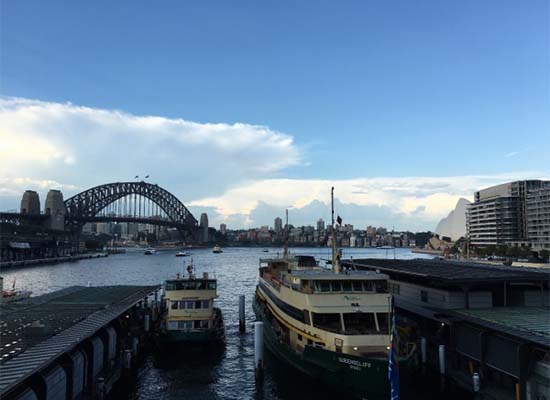 Circular Quay
Circular Quay
- Advanced English at Sydney University(TLP)
-
Shunsuke Matsuno(LII)
On January 10th, we traveled from cold midwinter Japan to hot midsummer Sydney. In this international study program, we participated in a two-week English class held by The Center for English Teaching (CET). We learned academic writing skills from CET instructors in the morning and joined various activities in which we were able to experience Sydney’s culture in the afternoon.
First, I am going to write about the academic writing class. We had to to complete an academic essay at the end of the class, and, with this goal in mind, we learned all manner of writing skills. The Tokyo University students were separated into 5 classes, and each class was made up of Tokyo students and Chinese students. In the class, we had a lot of opportunities to talk in small groups about various topics. I got the impression that the Chinese students` English level was not that high. However, they certainly had their own unique opinions, and I enjoyed exchanging opinions with the Chinese students who had different cultural backgrounds from me.
After the class, we had various activities such as participating in guest lectures and making videos with student ambassadors from Sydney University. To tell the truth, I found most of the activities somewhat dull. However, I found one lecture particularly interesting in which we made pairs with Chinese students and studied cross cultural communication. In this way, I was able deepen my understanding not only of China but also of Japan by discussing the culture and conventions of each county.
On the weekends, because we did not have class or other activities, we spent most of the time sightseeing. I went to the Sydney Opera House, Bondi Beach, Manly Beach, and the Blue Mountains etc. When I took a trip away from the center of Sydney, I saw a lot of vegetation and was able to lesson my daily fatigue.
Overall, this program was interesting and fun. The program owes its success to the program organizers Dr. Sawayanagi and Mr. Sato, the Tokyo students who joined this program with me, and the teachers at Sydney University. I hope this program will continue to develop further.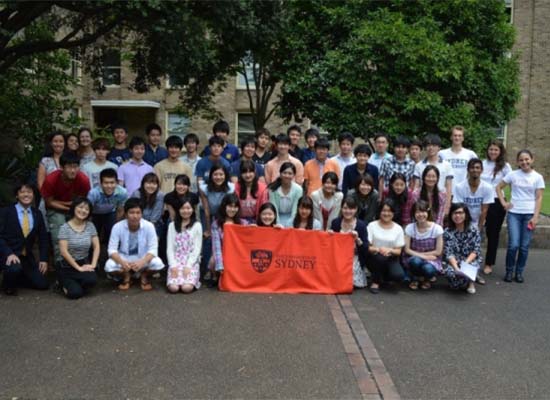 Smile after Graduation Ceremony
Smile after Graduation Ceremony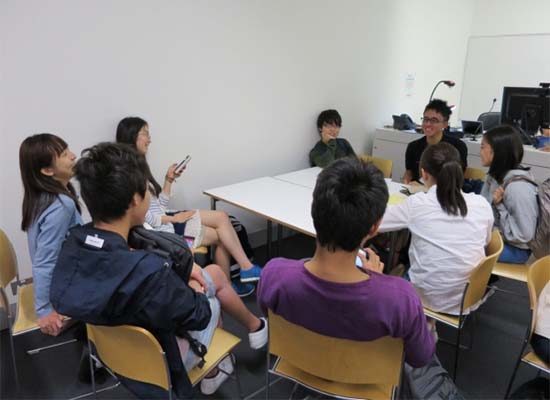 Discussion with Friends
Discussion with Friends
- UTokyo/ANU Exchange in Tokyo
-
W.K.(Natural Science I)
I think our group did well with daily reflection. We gathered every day and discussed for about an hour. Through the course, I learned a lot of things, and I have chosen some to reflect on here. What I found most interesting was the gender problem involving mountains in Japan. I did not know that there are still mountains which women cannot access. What was more surprising was that the local women supported this custom. I could not logically understand this reasoning and therefore found it interesting.
I also gained a lot through this course in terms of skills and attitudes toward learning. During lectures at the University of Tokyo, it is unusual for students to ask questions. However, in this program, we were encouraged to do so, and there were several questions asked in each session. This was a fresh experience for me and I was able to ask questions and participate in the discussions as well. It was a great experience. My attitude towards lectures changed and became more positive.
What I appreciated most about this program is that we were divided into five groups. Due to this group system, we were able to exchange a lot with one another. Every day after lectures we spent our free time together, and the more formal meetings with group members were also really meaningful. I had many opportunities to communicate with ANU students, which improved my English and communication skills.
The last thing I want to mention is that because I participated in the first part of the program, conducted in Japan, I was able enjoy myself in Australia during the ANU program as well. Because we had a chance to experience a similar program in Tokyo, we did not hesitate to proactively participate in the ANU program. Therefore, we were able to experience a great number of things starting right from the very first day in Australia. Moreover, even though the group system was not used in Australia, I still spent most of my stay with my ANU friends.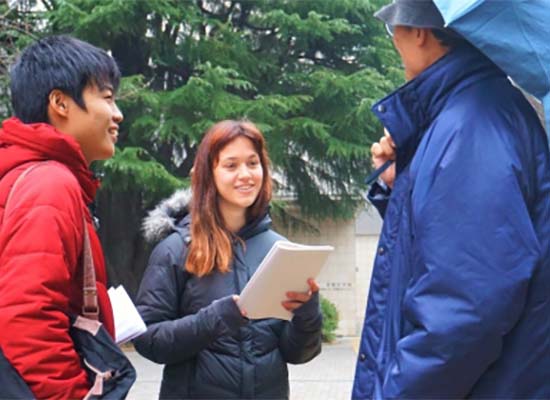 In an interview task
In an interview task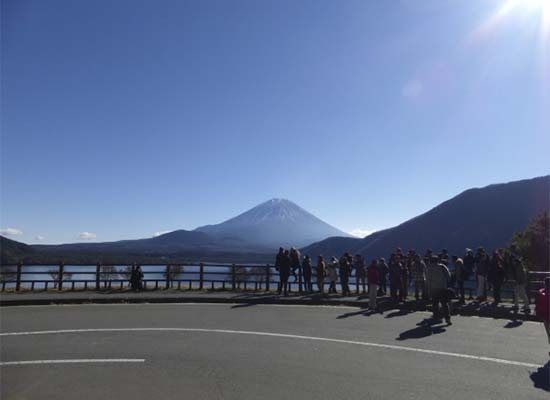 Beautiful view!!
Beautiful view!!
- UTokyo/ANU Exchange in Canberra/Kioloa
-
E. U. (Humanities and Social Sciences I, Junior Division)
I decided to participate in this program because I didn’t want to just go abroad and study English. I was interested in learning in English interactively, through lectures and field trips. The courses covered diverse topics from art to environmental issues, and I was able to come in contact with academic disciplines that I had never studied at my own university. Also, because we were spending almost all day every day with the ANU students, I had the opportunity to think about how to build good relationships and become friends with people of a different culture, with different customs and ways of thinking. In my own way I think that I was successful in this. I think that as long as you participate in this program knowing what you want to accomplish, you will have many constructive experiences. Due to the kind professors and TA’s who were always there to help when I had a problem or wasn’t sure of something on my own, the time I spent in Australia was very valuable.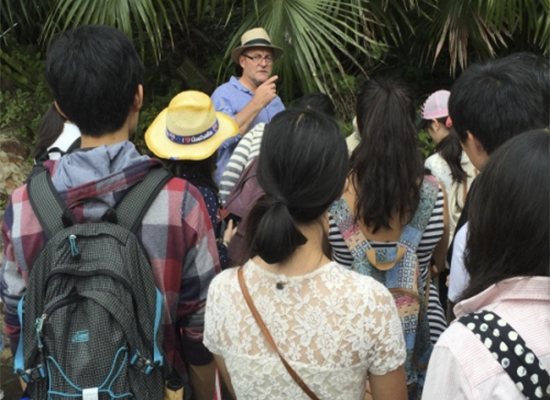 Visiting Australian National Botanic Gardens
Visiting Australian National Botanic Gardens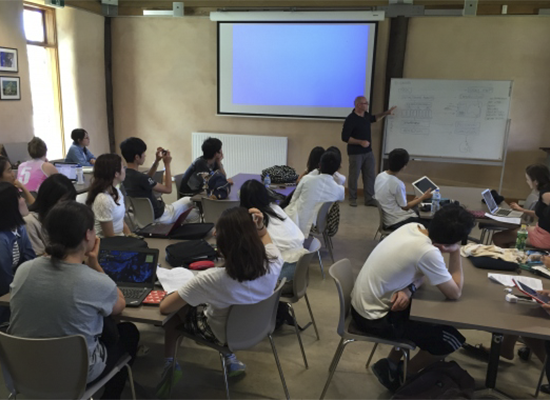 Participated in a series of seminars
Participated in a series of seminars
Turkmenistan
- International Peace and Conflict Resolution: Study Tour in Turkmenistan
- 詳細はこちらをご覧ください。
S Semester
Italy
全て開く
- Learning the Italian Language and Italian Culture
-
Hiroki Yoshimura (LI)
In August 2015, 16 students from the University of Tokyo, including myself, studied in Italy. We participated in a course held by our university which was about Italian language and culture. I had two motives for participating. The first was that I wanted to know how capable I was in using the Italian language I had been studying for one and a half years. The other was that I had a strong desire to go abroad because I had never been to a foreign country, and I wanted to go to a foreign country where I could make myself understood in the local language even if it would be so on a very small scale.
In Italy, I not only studied the language but also directly experienced a culture, very different from Japan. As a result, I was able to widen my perspective and becom more international. I am grateful to have received such an opportunity, and I will report below my impressions of the study there and the places where I visited.
Italy is divided into three parts: north, central, and south. Umbria is located in the middle of central Italy, and we stayed in its capital Perugia.
We attended the University for foreigners of Perugia for a month. All new students had to take a test before the beginning of the lessons, and then were divided into six classes according to the result. I was admitted to class B2, which is the third from top class. But since I was only given the written examination although the test usually consisted of a written and oral one, I think I was examined perfunctorily.
The lessons were composed of grammar, oral exercise, listening, and study of Italian culture. I struggled most in the oral exercise. In the class, the professor would pose a theme to discuss and the students would discuss it with the professor. I was very impressed that every student, especially the ones from Europe, would state their own opinions based on clear evidence. I have heard that they had been educated to do so voluntarily since they were a child, but when I actually debated with them, I was overwhelmed and often got knocked out of the debate. I most deeply regret the time when we talked about nuclear power. I was born in Hiroshima, so I felt a strong sense of responsibility to take an active part in the discussion, as a man from a city which has been atom-bombed and also as a man from the country where a nuclear plant accident occurred. I tried to express my own opinion to the professor and other students and develop the discussion, but I was at a loss for words in only a few minutes and eventually was repeating “Si. (Exactly.)”.
I regret that in Japan I did not practice expressing my own view in Italian. In addition, when I was studying Italian in Japan, I tended to attach a greater importance on the grammar over vocabulary. In retrospect, it would be more beneficial to have studied a vocabulary book before going to Italy.
Well anyway, staying in a foreign country is a pleasant and very interesting way to study a local language. If you go shopping at a supermarket, you can learn tons of new nouns, and if you talk with professors, students, and people in a town, you can get a perfect opportunity to practice the conjugation of verbs. If you go to a church, you can read the history of the language, which leads to modern Italian, and if you go to a soccer stadium, you can hear many parolacce (slangs) flying back and forth, which you will not find in any textbooks sold in Japan. You can hardly forget the words that you have collected with your five senses. When I was not able to make myself understood to a friend, I looked up words meaning precisely what I wanted to say. I was very happy when my friend smiled when I used the words that I had looked up in the dictionary. In contrast, I was deeply disappointed when I had no choice but to communicate in English because of not being capable to understand the Italian used.
On the weekends, I went out to the center of the town, the suburbs of Perugia, and to sightseeing spots in Umbria. Perugia has a very long history. Right next to the university there is a huge gate constructed by Etruscans in the third century B.C. In the old center of the town, there remains many solemn churches. A lot of tourists come to Perugia in order to visit them. We went on a day tour prepared by the university to Assisi, famous asa sacred place for pilgrimage. The most impressive place for me was Lake Trasimeno located in the west of Perugia. I went there on a day trip alone for various reasons, and I realized my maturity a little after I went through many thrilling experiences. I feel sorry that I cannot mention the details because of the limited space.
In the end, I want to say thank you to Prof. Muramatsu, Prof. Hyuga, Prof. Sawayanagi, and Prof. Farinelli of the University for Foreigners of Perugia who made careful preparations for this global praxis. Also, I want to thank my parents for helping me with the expenses and my friends both in Japan and in Italy for helping me have a wonderful time on this one-month journey.
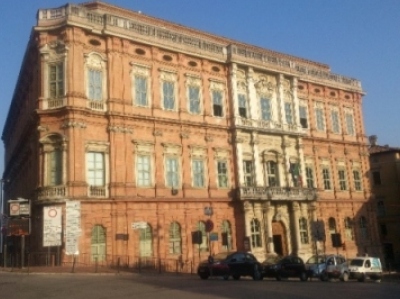
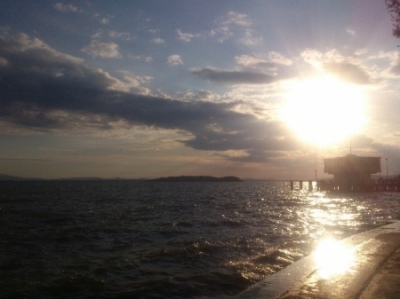
- Learning the Italian Language and Italian Culture
-
Tatsumi Yoshida (SII)
Through this program in Italy I learned not only language, but also many other things. Through the experiences of daily life and activities, I was able to think about the composition of cities and culture. It was my first time to go abroad and I feel this program will significantly influence my future and way of thinking.
During the trips to various cities, I noticed that there were differences in the composition of many cities. In mid-Italy where Perugia lies there are many mountains and hills, and it leads to long distances between cities and there were only few houses between cities. Some cities were divided in two parts: modern and high buildings were concentrated at the foot of a mountain or hill, but old and historical ones were concentrated at the top part. However, these characteristics disappeared heading north or in large cities, and boundaries between cities would be vague. For example, in Bologna modern buildings or large parks were outside the remains of the castle walls and buildings with a traditional look were inside. On the other hand, in Milano the design and color of buildings lacked unity and you could not notice the difference between buildings outside and inside the remains of the wall. Also, people and foods become multinational going north and in large cities
By the way, globalization is one of the most important words in recent years, but should we accept it so easily? Growing globalization will cause a fusion between societies in terms of race, culture and thought, and this fusion might lead to the instability of complex social system. This fusion is seen also in the change of the composition of the cities I mentioned above. A city which runs into another city seems to lack unity and be distorted because its boundaries change and waver constantly.
Those who belong to the international community like university often take a positive position towards globalization unconsciously. A global point of view is necessary now, and we should think about globalization critically. Learning foreign languages or studying abroad leads not only to mutual understanding, but also to sympathy between people, and promotes fusion and stability of society. The overseas program is good opportunity to come in deep contact with different societies, and I hope that many people will participate in such programs.
Germany
- Current Situation of the EU and its Problems:What we can learn from EU about regional integration
-
R.S. (LIII)
From August 2nd to 12th, we stayed in Otzenhausen, a place not far from Luxembourg and Belgium. We also visited 4 places: Bonn, Brussels, Luxembourg, and Trier, which house various EU-related institutions. We listened to lectures by university professors and EU officials, and we actively participated in workshops related to the topics of the lectures. Many of the activities were devised to relate to the program's theme: “Regional Integration and Cooperation – The EU and East Asia in 2015”. The lectures covered a wide range of subjects, such as politics, economics, environment and law, which provided us with a multilateral perspective on the EU.
During the program, we had the opportunity to interact with graduate students from Ewha University of Korea and students from Ghent University of Belgium. Through many activities done at the workshops and lectures as well as during free time, we deepened friendships with these students. When we went on excursions to the 4 places, we also had cultural experiences by viewing historical buildings and enjoying local food.
Currently, the EU is facing many huge problems such as the economic crisis in Greece and refugees from Syria. Japan is a geographically isolated country and is on the opposite side of the Eurasia continent: therefore, as Japanese, we are only able to understand the existence of the EU conceptually and superficially. However, through the lectures, some of which are given at sites where actual EU activities take place, I realized that this project of regional integration is a massive accumulation of efforts in pursuit of peace and prosperity in response to the tragedy of the two world wars. My knowledge of the EU changed from just an organization in a textbook to something real.
By engaging in talks with other participants, I gained experience beyond what I had expected. The participants were international. In addition to students from Korea and Belgium, there were some students from China, India, and Tanzania, each having different backgrounds. In spite of the diversity of the backgrounds, the total number of the participants was only 37, which was small enough to facilitate communication. Therefore, many different opinions and ideas were shared, and I was inspired in many ways. In addition, the participants spanned from college freshmen to graduate students, which gave me, a freshman, a good opportunity to learn from others’ rich views.
Through the lectures by professors and EU officials, the visits and the exchange of ideas with others students, ESA has given me a deeper understanding of regional integration’s deep implications to various aspects of society. East Asia has different degree of shared values, different history and geopolitical conflicts from Europe. The visit made me think that the path to regional integration in East Asia will not be a simple “cut and paste” of the EU system. I feel that if it is to be realized, then it will probably be made gradually by the members forming common ideals, values and objectives, while making reference to the rich experiences and achievements made by European states.
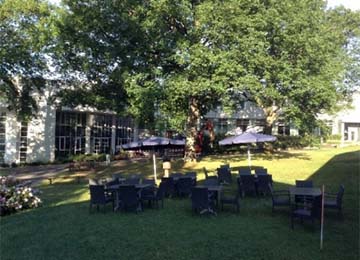
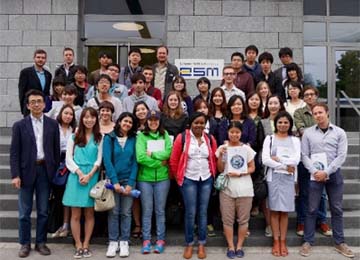
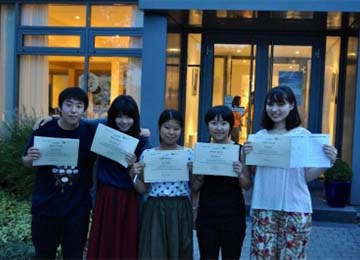
Greece and France
- The Olympics in an Academic Perspective
-
Co-written by 14 students
The recently completed Global Praxis Course “The Olympics in an Academic Perspective,” was comprised of pre-departure lectures at the Komaba Campus, followed by field work in both France and Greece. During the pre-departure lectures, we learned about the ancient Olympics, the philosophy behind the games, Greek art featuring the Olympics, physical motions of various Olympic sporting events as well as the “restoration” of the Olympics and its development in modern times. From these lectures, we gained the knowledge necessary to think critically about an event which had previously seemed just a vague television broadcast. Through this course, we acquired knowledge of the intellectual background of Olympic Games, which otherwise we tend to regard as a mere international sporting event.
From August 30th to September 9th we made a study trip to Greece and France. In Greece we visited various sites associated with the Olympics. We also attended a lecture by professor Karali-Giannakopoulou at the National and Kapodistrian University of Athens. We had a chance to run a race at Olympia in the Peloponnesus. Olympia is the place where the ancient Olympics were conducted, and where even today the ceremonial kindling of the Olympic flame every time the Olympic Games is held. We even had a chance to visit the town of Marathon, the birthplace of the marathon legend. Then we visited the grounds of the first modern Olympic Games in Athens and ran a race here as well. We also enjoyed a fruitful discussion with students from the National and Kapodistrian University of Athens and students from other Greek universities.
The recently completed Global Praxis Course “The Olympics in an Academic Perspective,” was comprised of pre-departure lectures at the Komaba Campus, followed by field work in both France and Greece. During the pre-departure lectures, we learned about the ancient Olympics, the philosophy behind the games, Greek art featuring the Olympics, physical motions of various Olympic sporting events as well as the “restoration” of the Olympics and its development in modern times.
From these lectures, we gained the knowledge necessary to think critically about an event which had previously seemed just a vague television broadcast. Through this course, we acquired knowledge of the intellectual background of Olympic Games, which otherwise we tend to regard as a mere international sporting event. From August 30th to September 9th we made a study trip to Greece and France. In Greece we visited various sites associated with the Olympics. We also attended a lecture by professor Karali-Giannakopoulou at the National and Kapodistrian University of Athens. We had a chance to run a race at Olympia in the Peloponnesus. Olympia is the place where the ancient Olympics were conducted, and where even today the ceremonial kindling of the Olympic flame every time the Olympic Games is held. We even had a chance to visit the town of Marathon, the birthplace of the marathon legend. Then we visited the grounds of the first modern Olympic Games in Athens and ran a race here as well. We also enjoyed a fruitful discussion with students from the National and Kapodistrian University of Athens and students from other Greek universities. Thanks to Masuo Nishihayashi, the ambassador to the Japanese Embassy in Athens, we were invited to a dinner party and discussion with members associated with the Greek Olympic Games. We were very lucky to be granted such a great opportunity, as we were able to meet Mr. Capralos, the president of the Greek Olympic committee, as well as Mr. Marsellos, who was a flag-bearer during the opening ceremony of Tokyo Olympics in 1964, and who ran the first stretch of the Olympic torch relay from Olympia that year.
In France we visited the Louvre Museum and had a chance to see Greek sculptures. We had seen pictures during our lectures, but the power radiating from the actual sculptures was incredible and took our breath away. As hosting the Olympics is a way for the host country to share their culture with the world, and because Tokyo will be the host of the 2020 Olympics, we held a discussion with students from INALCO (the National Institute for Oriental Languages and Civilizations). We used Junichiro Tanizaki’s “In Praise of Shadows” and Japanese popular culture to discuss the simultaneous existence of ancient Japanese culture with new cultural trends. We were pleasantly surprised by how deeply the French students understood and appreciated Japanese culture.
We learned a lot from this course. Through the courses we took at the Komaba campus, as well as our experiences in Greece and France, we came to understand the Olympics from an academic, liberal arts perspective. Also, while this doesn’t have much to do with the Olympics, this course taught us what is needed for an individual to be a global citizen. When we managed to speak even a small amount of Greek in Greece and French in France, the local people treated us with incredible kindness. When we used only English in conversation with local people we were treated as mere foreigners. But when we attempted even just to say hello in the local language, people opened up their hearts to us. This experience made us realize that globalization does not and should not mean the domination of the English language. We should never forget to respect the native languages of different countries and in turn the culture that lies behind it. We also learned that the most important thing about communicating with foreign people is to have your own opinion about various matters. This realization taught us the importance of using our time as university students to gain a good foundation of knowledge and become educated individuals. Since students from all different majors and courses were able to participate in this course, we all had a chance to share opinions with people with different points of view, and in doing so challenged ourselves and others intellectually.
Finally, we would like to say a big thank you to all of the professors who were involved in making this course possible, and in particular to Professor Sawayanagi, who both organized our classes and served as leader and guide during our time abroad, as well as to the many people we met in Greece and France.
Thank you. Ευχαριστώ πάρα πολύ. Merci beaucoup.
Taiga Ida (SI), Yuta Kitaoka (LI), Hiroyuki Saegusa (LIII), Nanoko Sasaki (LIII),Takuya Sato (SI), Yuna Tanaka (LII), Shohei Naito (SI), Takashi Noda (LI),Lisse Hasegawa (LII), Takahiro Miura (SI), Masafumi Mori (SIII),Ryutaro Yasui (LIII), Atsushi Yokoi (LII), Haruka Watanabe (LIII)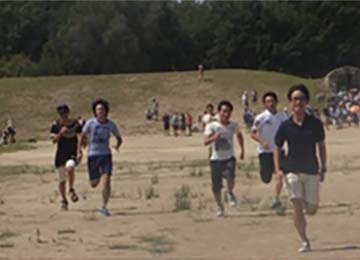 Running Races on the Grounds of Ancient Olympia
Running Races on the Grounds of Ancient Olympia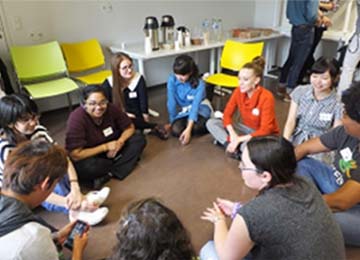 Discussion with INALCO Students
Discussion with INALCO Students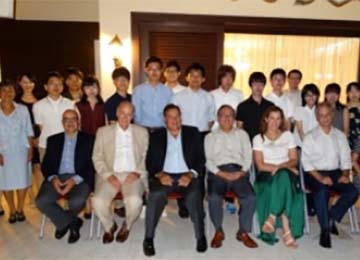 Dinner Party at the Residence of the Japanese to Greece
Dinner Party at the Residence of the Japanese to Greece